20 Chesham Place SW1
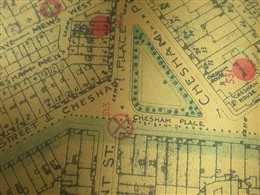
Bomb Map: 20 Chesham Place
Copyright Westminster City Archives
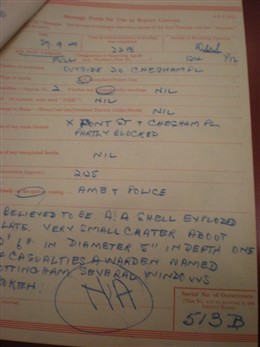
ARP Message, 20 Chesham Place, 27 September 1940
Copyright Westminster City Archives
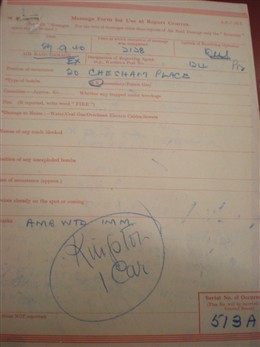
ARP Message, 20 Chesham Place, 27 September 1940
Copyright Westminster City Archives
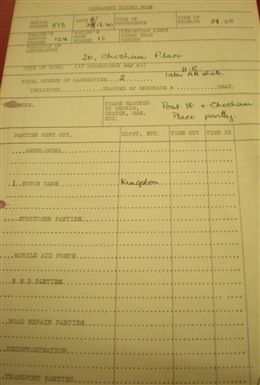
Incident Report, 20 Chesham Place SW1, 27 September 1940
Copyright Westminster City Archives
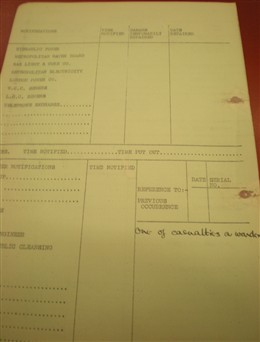
Incident Report, 20 Chesham Place, 27 September 1940
Copyright Westminster City Archives
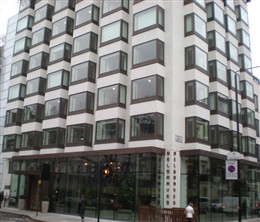
Chesham Street site, 2012
James Ramey
27 September 1940
By James Ramey
At 9.28pm on 27 September 1940 a high explosive bomb was reported falling in Belgravia opposite 20 Chesham Place SW1. ARP Warden Post 124 was the first to respond. Two casualties were reported. A later incident report received by the Westminster Control Centre instead confirmed the impact of an anti-aircraft shell: “Believed to be A.A. Shell exploded late. Very small crater about 2’ 6” in diameter 5” in depth. One of the casualties a warden named Nottingham, several windows broken.”
Pont Street and Chesham Place were partially blocked. Conflicting reports placed the incident at either 20 Chesham Place or 7 Chesham Place.
27 September 1940 witnessed intense German air attacks. Throughout the day hundreds of German bombers hit targets as they ranged across Britain. Despite this, the Luftwaffe suffered heavy casualties (54 aircraft shot down).
Elsewhere, 27 September also saw the signing of the Tripartite Pact. This pact, signed by Germany, Imperial Japan and Fascist Italy, guaranteed that if any nation declared war against any of the three then they in turn would automatically declare war on that country. United States Ambassador to London in 1940 Joseph Kennedy, father of future United States President John F. Kennedy, wrote caustically to President Franklin Roosevelt and Secretary of State Cordell Hull,
"For the President and the Secretary.
The night raids are continuing to do, I think, substantial damage, and the day raids of the last three days have dealt most serious blows to Bristol, Southampton, and Liverpool. Production is definitely falling, regardless of what reports you may be getting, and with transportation smashed up the way it is, the present production output will continue to fall.
My own feeling is that… [the British] are in a bad way. Bombers have got through in the daytime on the last three days, and on four occasions today substantial numbers of German planes have flown over London and have done some daylight bombing.
I cannot impress upon you strongly enough my complete lack of confidence in the entire [British] conduct of this war. I was delighted to see that the President said he was not going to enter the war because to enter this war, imagining for a minute that the English have anything to offer in the line of leadership or productive capacity in industry that could be of the slightest value to us, would be a complete misapprehension"
While the United States military mission to London concluded that London was still able to continue fighting, many people around the world believed that Britain was now at the point of defeat. In the event, Kennedy's gloomy forecast proved to be wildly inaccurate.
Today 7 Chesham Street houses the Lesotho High Commission and 20 Chesham Street is the Belgraves, a Thompson Hotel.